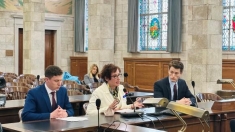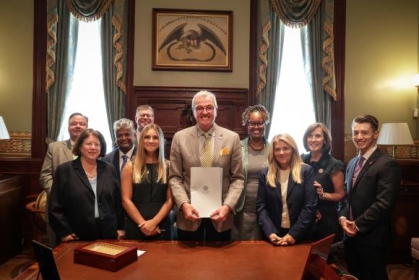Legislative Advocacy Advances Two Bills in New Jersey

and Nicholas Gangemi '23 testifying at the
New Jersey Statehouse in January 2023.
Though law students are no strangers to research, it’s rare for their work to land on the floor of a governing body and lead to concrete legal change, all before they pass the bar. But that’s just what happened after Professor Ruth Anne Robbins reached out to members of the New Jersey Legislature and offered to help advance two significant bills.
Beginning in spring 2022, Prof. Robbins and her students benchmarked existing laws, gathered client stories, conducted nationwide statistical research and, ultimately, testified before state legislators. The result? One newly enacted state law and another bill awaiting final passage in the Senate. This kind of work will have a formal home at Rutgers Law School beginning in 2024, when Robbins launches the Legislative Advocacy Clinic.
VASPA: Expanding Victim Protection
New Jersey has two parallel systems that abuse victims can use to obtain restraining orders against their abusers. The first system—the Prevention of Domestic Violence Act—is for those in a “family-like” relationship with their abuser (for example, current or former spouses, dating partners) and provides extraordinary protections, including restraining orders. Victims who don’t have a family-like relationship with their abuser have been eligible for similar protections through the 2015 Sexual Assault Survivor Protection Act (SASPA), but only in very specific circumstances. Senate Bill 1517 sought to expand SASPA to include two additional circumstances: stalking and cyber harassment.
After researching how these cases are handled in other states and how New Jersey can better support these victims in attaining restraining orders, Prof. Robbins and two of her students testified before Assembly and Senate committees in the fall of 2022 and spring of 2023.
On July 24, New Jersey Governor Phil Murphy signed Bill 1517 into law, rebranding SASPA as the Victim’s Assistance and Survivor Protection Act (VASPA).
“This new law gives a pathway to people who have been stalked or harassed online to receive a restraining order without having to go through the criminal procedure of punishing the perpetrator with an arrest, court proceeding, and sentencing,” Robbins explains.
For students, participating in this process was invaluable. “Representing survivors in the Domestic Violence Clinic and advocating to keep New Jersey’s civil protection laws the strongest in the nation was the capstone of my legal education,” says Nicholas Gangemi ’23, a member of the Domestic Violence Clinic and one of the students who testified. “The clinical work, research, and advocacy led by Rutgers faculty represents an institutional commitment to public service and highlights the impact that Rutgers students can have prior to graduation.”

Bill S-1809: Expanding the Understanding of Domestic Violence Dynamics
In addition to physical abuse, perpetrators of domestic violence can often practice what’s known as coercive control. A hallmark of abusive relationships, coercive control includes (but isn’t limited to) behaviors like isolating the victim from family and friends, and controlling access to medication, medical treatment, or transportation. The concept of coercive control is not currently included in the New Jersey Prevention of Domestic Violence Act (PDVA), which means that judges are not required to consider these abuses for victims seeking a restraining order.
What PDVA does require is that victims demonstrate that a restraining order is necessary to prevent future harm; that said, the courts have not articulated how a litigant can demonstrate that need.
“The lack of a clearly defined ‘necessity’ test has presented a vexing issue for judges and lawyers but poses a much larger problem for self-represented litigants who have no real notice that they must present evidence of ‘necessity,’ and no guidance about how to do so,” says Gangemi. At the behest of the NJ Coalition to End Domestic Violence, Robbins and her students set to work on researching and substantiating these clarifications and changes.
If enacted, Bill A-1475 places litigants on notice that they must provide evidence of “necessity” to obtain protection, and further permits judges to consider evidence of coercive control in their analysis of whether the victim “needs” a restraining order. The bill passed the Assembly at the end of March, becoming S-1809 as it awaits passage by the Senate, before it can land on the Governor’s desk for signing.

“Many domestic violence cases are individuals representing themselves without the help of an attorney,” Robbins adds. “The hope is that this bill can help victims see these examples of abusive control explicitly in the law and empower them to seek relief.”